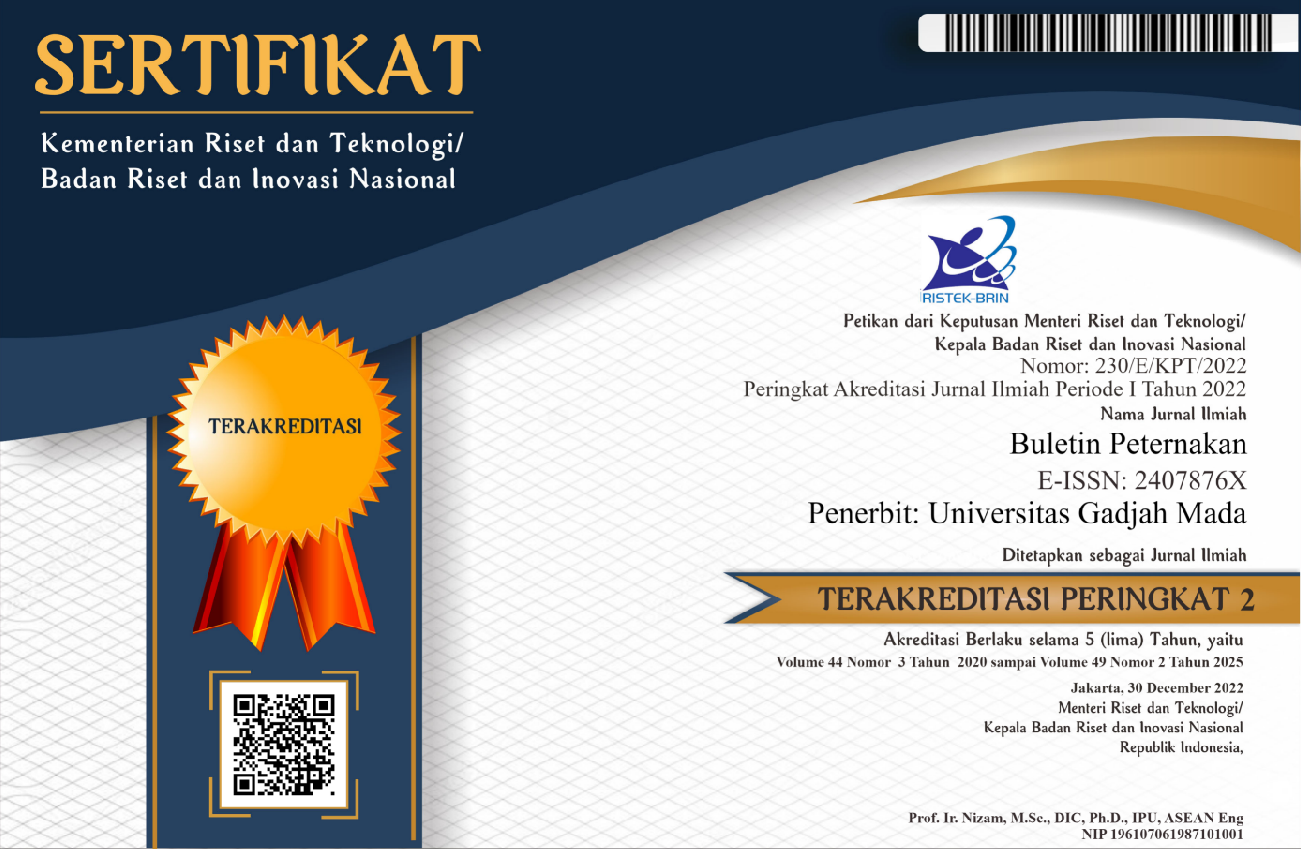The Effect of Ensiled Maize Stover Combined with Additives as an Animal Feed
Binti Nur Rohmah(1), Hartutik Hartutik(2*), Marjuki Marjuki(3)
(1) Department of Animal Nutrition and Feed Science, Faculty of Animal Science, University of Brawijaya, Malang, 65145, Indonesia
(2) Department of Animal Nutrition and Feed Science, Faculty of Animal Science, University of Brawijaya, Malang, 65145, Indonesia
(3) Department of Animal Nutrition and Feed Science, Faculty of Animal Science, University of Brawijaya, Malang, 65145, Indonesia
(*) Corresponding Author
Abstract
The research purpose was to determine the effect of addition starter Pediococcus pentosaceus with different level in the maize stover silage on the in vitro digestibility, fermentation product, and microbial protein synthesis. The treatments consist of T1 = maize stover silage + molasses 10%, T2 = maize stover silage + molasses 10% + P. pentosaceus (1x105 cfu/g), and T3 = maize stover silage + molasses 10% + P. pentosaceus (1x106 cfu/g), fermented for 0 and 21 days. The research method was an experiment by using Randomized Block Design (RBD), with 3 treatments and 4 blocks. The result showed that addition of starter P. pentosaceus in the maize stover silage gave significant effect (P<0.05) on dry matter (T1 (65.67±1.56%), T2 (65.78±0.60%), and T3 (67.54±1.11%)), and organic matter digestibility (T1 (66.93±0.48%), T2 (68.15±1.34%), T3 (68.68±1.04%)) at 21 days incubation. The result of statistical analysis showed that treatment gave significant effect (P<0.05) on gas production at 96 hours of silage with 0 day incubation, T1 (114.74±0.60 ml/500mg DM), T2 (116.12±1.44 ml/500mg DM), T3 (116.97±1.12 ml/500mg DM) and 21 days incubation, T1 (124.27±0.59 ml/500mg DM), T2 (125.27±1.49 ml/500mg DM), and T3 (126.16±1.26 ml/500mg DM). All treatments not gave significant effect (P˃0.05) on degradability, NH3 and microbial protein synthesis on 0 days incubation. However, did it gave significantly effect (P˂0.05) in 21 days incubation silage, dry matter degradability (T1 (66.16±0.42%), T2 (65.70±0.58%), T3 (66.66±0.21%)), organic matter degradability (T1 (65.67±1.56%), T2 (65.78±0.60%), and T3 (67.54±1.11%)), microbial protein synthesis (T1 (37.72±0.13 g/N/kg OM apparently fermented), T2 (37.84±0.64 g/N/kg OM apparently fermented), T3 (38.82±0.56 g/N/kg OM apparently fermented). It can be concluded that addition of starter P. pentosaceus (1x106 cfu/g) on maize stover silage with 21 days incubation can produce silage with good quality on the in vitro digestibility, fermentation product, and microbial protein synthesis.
Keywords
Full Text:
PDFReferences
Andayani, J. 2010. Evaluasi kecernaan in vitro bahan kering, bahan organik dan protein kasar penggunaan kulit buah jagung amoniasi dalam ransum ternak sapi. Jurnal Ilmiah Ilmu-Ilmu Peternakan 13: 252-259.
ARC. 1984. The Nutrient Requirement of Ruminant Livestock. In Commonwealth Agricultural Bureaux. England, Sloug.
Arora, S. P. 1989. Pencernaan Mikroba pada Ruminansia. Terjemahan : R. Murwani. Gadjah Mada University Press, Yogyakarta.
Assakur, M. 2013. Degradasi bahan kering, nilai pH dan produksi gas sistem rumen in vitro terhadap kulit buah (Theobroma cacao) yang diberi perlakuan berbeda. Fakultas Peternakan. Universitas Hasanuddin, Makassar.
Astutik, A. S., Mashudi, A. Irsyamawati, and P. H. Ndaru. 2019. Pengaruh silase rumput odot (Pennisetum purpureum cv. Mott) dengan penambahan bakteri Lactobacillus plantarum terhadap produksi gas dan kecernaan secara in vitro. Jurnal Nutrisi Ternak Tropis 2: 10-18.
Blummel, M., H. Steingass, and K. Becker. 1997. The relationship between in vitro gas production, in vitro microbial biomass yield and 15n incorporated and its implication for the predictio of voluntary feed intake of roughages. J. Anim. Nutr. 77: 911-921.
Conway, E. J. 1957. Microdiffusion Analysis and Volumetric Error. Crosby Lockwood, London.
Holik, Y. L. A., L. Abdullah, and P. D. M. H. Karti 2019. Evaluasi nutrisi silase kultivar baru tanaman sorgum (Sorghum Bicolor) dengan penambahan legum Indigofera sp. pada taraf berbeda. Jurnal Ilmu Nutrisi dan Teknologi Pangan 17: 38-46.
Karimuna, L., Safitri, and L. O. Sabbarudin. 2009. Pengaruh jarak tanam dan pemangkasan terhadap kualitas silase dua varietas jagung (Zea mays L.). Agripet. 9: 17-25.
Makkar, H. P. S., M. Blummel, and K. Becker. 1995. Formation of complexes between polyvinyl pyroli dones on polyethilene glycoles and tannin and their implication in gas production and true digestibility. In in-vitro Tech. British J. Feed Nutr. 73: 893-913.
Nusio, L. G. 2005. Silage production from tropical forages. In: Silage Production And Utilization. Wageningen Academic Publication, Wagenigen.
Ohmomo, S., O. Tanaka, H. K. Kitamoto, and Y. Cai. 2002. Silage and microbial performance, old story but new problems. JARQ. 36: 59-71.
Riswandi, Muhakka, and M. Lehan. 2015. Evaluasi nilai kecernaan secara in vitro ransum ternak sapi Bali yang di suplementasi dengan probiotik bioplus. Jurnal Peternakan Sriwijaya 4: 35-46.
Steel, R. G. and J. H. Torrie. 1993. Prinsip dan Prosedur Statistika (Pendekatan Biometrik). Penerjemah B. Sumantri. Gramedia Pustaka Utama.
Suryani, N. N., I. K. M. Budiasa, and I. P. A. Astawa. 2014. Fermentasi rumen dan sintesis protein mikroba kambing Peranakan Etawa yang diberi pakan dengan komposisi hijauan beragam dan level konsentrat berbeda. Majalah Ilmiah Peternakan 17: 56-60.
Sutardi, T. 1978. Peningkatan Mutu Hasil Limbah Lignoselulosa Sebagai Pakan Ternak. Fakultas Peternakan. Institut Pertanian Bogor, Bogor.
Syahrir, S., K. G. Wiryawan, M. Parakkasi, Winugroho, and O. N. P. Sari. 2009. Efektivitas daun murbei sebagai pengganti konsentrat dalam sistem rumen in vitro. Media Peternakan 32: 112-119.
Tilley, J. M. A. and R. A. Terry. 1963. The relationship between the soluble constituent herbage and their dry matter digestibility. J. British Feed Sci. 18: 104-111.
Weinberg, Z. G., G. Szakacs, G. Ashbell, and Y. Hen. 1999. The effect of Lactobacillus bucheri and L. plantarum, applied at ensiling, on the ensiling fermentation and aerobic stability of wheat and sorghum silages. J. Industrial Microbiol. Biotechnol. 23: 218-222.
Widodo, D. S. 2014. Pengaruh Lama Fermentasi dan Penambahan Inokulum Lactobacillus plantarum dan Lactobacillus fermentum terhadap Kualitas Silase Tebon Jagung (Zea mays). Jurusan Biologi, Fakultas Sains dan Teknologi UIN Maulana Malik Ibrahim Malang, Malang.
Article Metrics
Refbacks

This work is licensed under a Creative Commons Attribution-ShareAlike 4.0 International License.
Buletin Peternakan (Bulletin of Animal Science) Indexed by:

This work is licensed under a Creative Commons Attribution-ShareAlike 4.0 International License.














